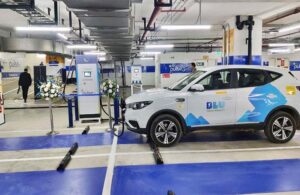Planning to expand its network beyond the country’s border, ride-hailing platform owning EV fleet, BluSmart has decided to test international waters.
 “BluSmart wants to pilot its operations in the Middle East and has asked drivers to keep their passport and other documents ready, as it plans to run a feasibility test of international markets,” a person in the know said. “If the company does go live with its plans, it will only be a 2024 event. The decision to launch in the market depends on the results yielded from the pilot. The company was yet to decide on its supplier and other finer details about the foray,” the person added.
“BluSmart wants to pilot its operations in the Middle East and has asked drivers to keep their passport and other documents ready, as it plans to run a feasibility test of international markets,” a person in the know said. “If the company does go live with its plans, it will only be a 2024 event. The decision to launch in the market depends on the results yielded from the pilot. The company was yet to decide on its supplier and other finer details about the foray,” the person added.
The developments at BluSmart come at a time when its business domestically is already facing competition from newer players like Evera, which has raised around Rs 60 crore from Germany’s IEG Investment Banking Group and Singapore’s Westova Global, among others to expand its EV fleet in the country to around 2,000, up 10X the current size of about 200, by end of the current calendar year.
Both Evera and BluSmart have expressed their inclination towards longer trips, like to airports, as the economies work out better as opposed to intra-city rides.
Even traditional and larger players, like Ola and Uber are marking their presence in the EV ride-hailing space, where BluSmart is popular. In January, Ola announced it was in the final stages of rolling out another pilot program wherein it would deploy 10,000 premium electric vehicles (EVs) for users on its cab-booking platform, after running a similar pilot in Nagpur in 2018.
BluSmart started operations in the Delhi NCR belt only around 3-4 years back and entered some regions of Bengaluru around September last year. Punit Goyal, co-founder of the company, had earlier told FE that the company would expand into cities like Hyderabad, Mumbai, Chennai and Kolkata over the coming quarters as India was a large enough market to solve for.
Last month BluSmart also received regulatory approvals to start operations from the Bengaluru airport, furthering its reach in the city.
Between the two regions, the Gurugram-based company currently operates about 5,000 EVs, an end-of-FY23 goal that the company had set and even met. BluSmart plans to add about 40,000-50,000 EVs over the coming 12-18 months, which will likely bring down operating costs from around 1.4 per kilometre, to lower than Rs 1 per kilometre, which will be about 8-9X cheaper than a petrol car on average. That would likely leave healthier margins in the hands of the company which hopes to turn profitable as early as end of the current calendar year, primarily on the back of increased demand and charging network monetization plans, as reported earlier. BluSmart owns all the cabs it runs and has drivers on it payroll, unlike Ola and Uber which are aggregators.
Currently, BluSmart’s fleet is dominated by Tata’s vehicles but includes cars from MG Motors, China’s BYD and SAIC Motor. Goyal said Tata’s supply was a challenge and that BluSmart was open to procuring from any/all original equipment manufacturers (OEMs) who provide vehicles at good prices to the company, to fuel its aggressive growth plans.

